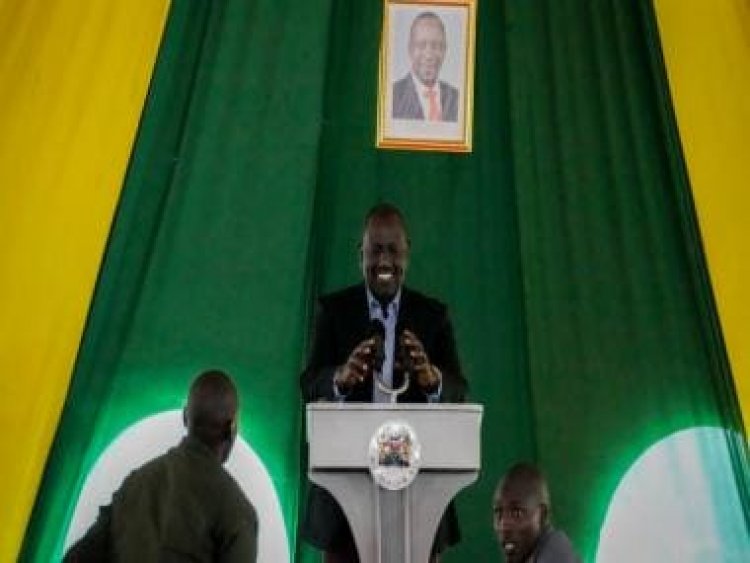Explained: The controversy surrounding Kenya's presidential polls
Explained: The controversy surrounding Kenya's presidential polls

As soon as Kenya’s sitting Deputy President William Ruto was declared the winner of the presidential election held last week, questions were raised over the election result’s amid fears of violent protests.
Kenya’s Election Commission Chief Wafula Chebukati announced on Monday, “William Samoei Ruto has been duly elected as the President of the Republic of Kenya.”
According to Kenya-based newspaper The Standard, while Ruto bagged 7,176,141 votes, his closest rival Raila Odinga received 6,942,930.
The other two candidates, David Mwaure and George Wajackoyah, got 31,987 and 61,969 votes, respectively.
Aftermath of the election result
As soon as the results were announced, videos appeared on social media showing protesters upturning chairs and manhandling the security personnel at an election centre in the capital city of Nairobi.
VIDEO: Chaos erupts at election centre as Willam Ruto wins Kenya presidential vote.
Ruto promises to "work with the opposition" moments after police force back fighting crowds pic.twitter.com/8Qt1y1Mx5M
— AFP News Agency (@AFP) August 16, 2022
The President-elect, Ruto promised in his first speech after the results to run a “transparent, open, democratic government” and work with the opposition “to the extent that they provide oversight” over his administration.
“There is no room for vengeance. There is no room for looking back. We are looking into the future,” he added.
However, his rival, Odinga late on Tuesday rejected the election results calling it a “travesty”.
“Our view is that the figures announced by Chebukati are null and void and must be quashed by a court of law,” he said, as per a Reuters report.
What is the controversy?
Odinga, who made a fifth attempt at the presidency, said his campaign will pursue “all constitutional and legal options” to challenge the election results. He was also leading the opinion polls.
His disagreement with the election result may be attributed to two reasons – the narrow margin of victory, and the open dissent among a number of election commissioners regarding the results.
In Kenya’s presidential elections, the winner requires more than 50 per cent of the total votes. Ruto scored a close 50.49 per cent votes, raising suspicion over the accuracy of the results.
Further, the electoral commission publicly split minutes before the declaration. Four of the seven commissioners, who were appointed last year by President Uhuru Kenyatta, asserted that the commission chair excluded them from the final steps before his declaration.
“The four of us are here and not at Bomas of Kenya (a village in Nairobi), where results will be announced, because of the opaque nature of how this phase has been handled. We, therefore, cannot take ownership of the results that will be announced. However, we have an open door that people can go to court and because of the same, we urge Kenyans to be peaceful because the rule of the law is going to prevail,” IEBC Vice Chairperson Juliana Cherera was quoted as saying by The Standard.
The IEBC chairman dismissed the allegations.
On Wednesday, commission chairman Wafula Chebukati in a statement responding to the allegations asserted that the four dissenting commissioners “demanded that the chairperson moderates the results for purpose of forcing an election re-run contrary to their oath of office. This is tantamount to subverting the Constitution and the sovereign will of the people of Kenya.”
What is next?
It is quite likely that Odinga will legally challenge the election results, especially since he was the closest to winning in his all five attempts.
He met with his team behind closed doors Wednesday. They have seven days from Monday’s declaration to file at the Supreme Court, which then has 14 days to rule on it.
It is not clear on what grounds Odinga would challenge the results in an election widely described by Kenyans and observers as more transparent and peaceful than ever. He has urged his often passionate supporters to remain calm.
“Ours is victory deferred, but it’s coming home,” Odinga's running mate, Martha Karua, told journalists Wednesday. “We’ll not let you down.”
If none of the candidates approach the court, Ruto will be sworn in as Kenya’s fifth president on 30 August.
With inputs from agencies
Read all the Latest News, Trending News, Cricket News, Bollywood News,
India News and Entertainment News here. Follow us on Facebook, Twitter and Instagram.
What's Your Reaction?


























































